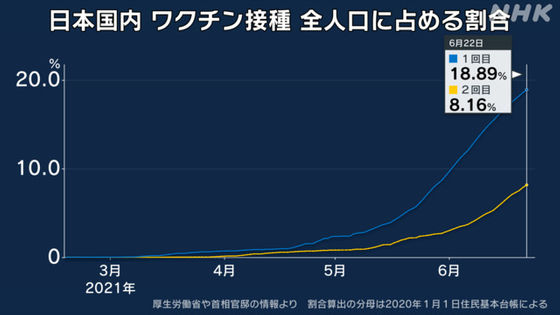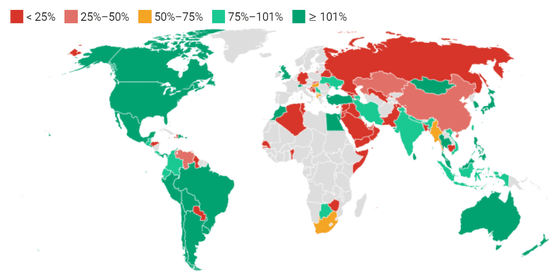What is the global 'vaccination rate gap'?

Distribution of the new coronavirus vaccine is progressing in Japan as well, and from June 17, 2021, the target age for vaccination at large-scale vaccination centers will change from '65 years old and over' to 'including 18 to 64 years old'. Enlarged. Given this situation, it is expected that many people will be vaccinated in Japan over time, but there are still many countries in the world that have not been vaccinated even by medical personnel.
Coronavirus (COVID-19) Vaccinations --Statistics and Research --Our World in Data
Global herd immunity remains out of reach because of inequitable vaccine distribution – 99% of people in poor countries are unvaccinated
https://theconversation.com/global-herd-immunity-remains-out-of-reach-because-of-inequitable-vaccine-distribution-99-of-people-in-poor-countries-are-unvaccinated-162040
In Japan, vaccination is progressing so rapidly that new acceptance of occupational vaccinations has to be suspended because the daily possible delivery of vaccines has reached the upper limit. As of June 22, approximately 18.89% of the total population has completed the first new coronavirus vaccination, and approximately 8.16% have completed a total of two vaccinations.

In addition, the page that summarizes the inoculation status of the new coronavirus vaccine in Japan in detail is below.
Vaccine status in Japan Side reaction information New coronavirus | NHK special site
As of June 21, about 10.04% of the world's population is said to have completed vaccination, but almost all of this 10.04% are from developed countries like Japan. According to Our World in Data , an online news site that specializes in global issues such as poverty and illness, only 0.9% of people in low-income countries have completed their first vaccination.
According to Maria de Jesus, an associate professor of healthcare inequality at American University, developed countries have adopted a strategy of 'buying up vaccines in advance' behind such 'vaccine inequality.' There is a problem. In one example, the United States has 1.2 billion doses of the new coronavirus vaccine, which means that 80% of all people can complete another vaccination after all the people have been vaccinated. In Canada, it is 388,100 doses, which is enough for all people to complete five vaccinations.
In this way, the map that color-codes the world from the viewpoint of 'vaccine procurement amount' is as follows. The closer it is to red, the less vaccine it needs for the entire population, the darker the green, the more vaccine it has, and the gray it means lack of data. It can be seen that most countries in the Americas, Japan, Australia, etc. have more vaccines than all the people need. In addition, Russia and China are red because these two countries use their own vaccines and the inoculation rate is not disclosed.

If left uncorrected, the death toll from the new coronavirus infection (COVID-19) is expected to increase. According to a (PDF file)
AIDS is a good example of this situation, which Associate Professor Jesus cites. AIDS was introduced in the 1990s as an effective anti-retroviral drug, saving millions of lives in developed countries. However, these anti-retroviral drugs are very expensive, and the first world's first anti-HIV drug, zidovudine, costs about $ 8,000 a year at the price at the time, or $ 19,000 at modern rates. It was about 2.1 million yen). Furthermore, due to concerns about price collapse, pharmaceutical companies have unified the prices of anti-HIV drugs internationally, so poor countries cannot afford it. Especially in sub-Saharan African countries where AIDS was rampant, about 22 million people were infected with AIDS as of 2000, and the HIV positive rate of adults is 7.5 to 10% in about two-thirds of the area. It was a plight.

Also, if there are still countries where vaccines are not available, the possibility of 'mutant strains occurring' continues to exist. In areas where infection with the new coronavirus has been prolonged, the possibility of the virus mutating is high, and 'aggressive new coronavirus mutant strains' that are more infectious and more lethal will be created. I have a concern.
What if some countries don't get the new corona vaccine? --GIGAZINE

Associate Professor Jesus said wealthy and highly vaccinated countries are beginning to take responsibility for increasing global vaccination rates and need to build a vaccine manufacturing infrastructure around the world to expand production worldwide. Insisted that there was.
Related Posts:
in Science, Posted by darkhorse_log





